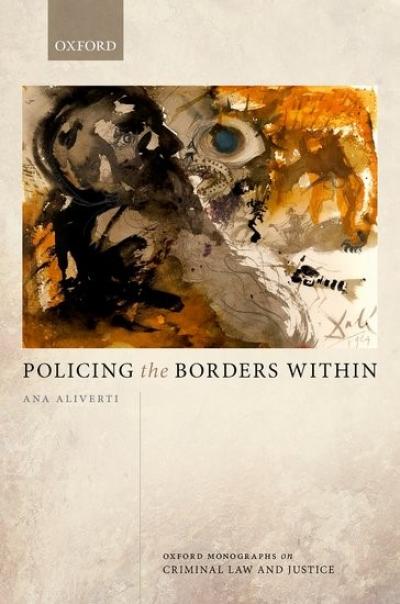All Souls Blog: Policing the Borders Within: Globalisation, State Power and Magic
Ana Aliverti is the Director of the Criminal Justice Center at Warwick Law School. She is also the Associate Director of Border Criminologies. She serves in the editorial boards of Theoretical Criminology, Delito y Sociedad, the Howard Journal of Crime and Justice, and Revista Española de Investigación Criminológica. Her research work looks at the intersections between criminal law and criminal justice, on the one hand, and border regimes, on the other, and explores the impact of such intertwining on the national criminal justice institutions and on those subject to the resulting set of controls.
Posted
Time to read
In this seminar, Dr. Aliverti introduced the important theoretical and empirical developments made within her new book, Policing the Borders Within (2021). The book examines the relationship between policing, borders, and social order through the lens of migration policing. It draws heavily on her extensive ethnographic research, conducted between 2016 and 2018, with the operational arm of the UK’s Immigration Enforcement – the Immigration Compliance and Enforcement team (ICE). Unlike most other European countries, this organisation is distinct from territorial police forces, and has completed the task of in-land immigration policing since the early 2000s. Whilst Immigration Enforcement in the UK has animated much debate about its role and function, there has been remarkably little documentation of its origins or structure, and its in-land policing activities remain largely hidden from view.
Dr. Aliverti began by setting the intellectual scene. Globally, there has been increased academic interest in how immigration control is becoming part and parcel of contemporary policing. This increasing entwinement is, she argued, a symptom of new demands and challenges facing the state in a fast-moving, interconnected world. Her work challenges critical academic readings which present the state as omnipresent and cohesive in its dealings with migration ‘crimes’. Instead, it seeks to understand how these trends are reproduced and understood by individuals working to produce the state on the ground, foregrounding the incompleteness of bureaucratic governance. Her aim, and significant achievement, is to open up space for a critique from within the state itself.
Deciphering crime amid global disorder demands unorthodox policing
Turning to selected extracts from her empirical material, Dr. Aliverti explored the particularities of immigration policing in the UK and how these are negotiated by individual officers tasked with its implementation. Drawing on work by Comaroff and Comaroff (2017), she explained that immigration policing highlights intractable challenges of policing in contemporary conditions, and demonstrates perceived insufficiencies in modern modes of forensic policing. Immigration officers were frustrated by their inability to decipher who people were, their nationality, or their previous criminal histories. Directions from up the chain of command were seen as volatile and changeable, leading to officers feeling – in her words - like ‘puppets, devoid of authority, and liable to control by unseen forces operating “up there”’.
In order to negotiate this uncertainty, officers adopted ‘unorthodox methods’, exercising a personal style of policing. In contrast to formalised, conventional policing methods and procedures, fragile relationships and knowledge networks became central, with individual officers developing personal expertise on nationalities and forms of crime. Hard data became mixed with hunches, intuitions, and stereotypes in the search for criminality: the rational and divine together. In this ‘DIY policing’, improvisation and experimentation were used to negotiate the disjuncture between immigration policies and the realities of operationalisation. The state is made personal, and academic analyses of a dystopian ‘all knowing’ cohesive state start to unravel.
The Magic of Immigration
This is where Dr. Aliverti introduced ‘magic’, a concept used by anthropologists concerned with the mythical aura surrounding state power, and in particular, the constant reinforcement required by post-colonial states. Immigration officers came to rely on non-rational, magic-like elements to solve policing problems in search of ‘order’. Building towards a wider critique of state authority, she argued that this manipulation and pliability of rules, and highly informalised way of reaching outcomes, should not be seen as departure from ordinary policing procedures, but instead as symptomatic of the economies of policing in which officers use ‘whatever means necessary’. In a globalised world, the meaning of ‘order’ is tied up with racialised logics: magic and race reinforce reciprocal ways of making unwanted foreigners disappear. The concept of ‘magic’ therefore highlights the coming together of the fantastical and the supernatural within immigration policing, emphasising its informal, haphazard elements. Of course, this conflicts with the presentation of ‘order’ coming from the Home Office.

The talk ended with a final reflection on the emotions of the officers involved in this study. What effect does this work have on those tasked with completing it? It is, Dr. Aliverti contends, often emotionally, physically and morally painful work. The task of bordering Britain confronts them, leaving them troubled and ambivalent about their jobs. Listening to these moments of discomfort and ambivalence opens up a powerful space for critique from within. In contrast to Weberian rational paradigms of bureaucracy, the non-rational, magic-like elements of foreign policing uncovers hidden forms of state power, complicating understandings of policing problems in the contemporary context. Dr. Aliverti’s analysis therefore makes significant contributions to understandings of the mundane challenges of producing local order in a globalised world.
Post by Vicky Taylor, DPhil student, Oxford Centre for Criminology
Keywords:
Share
YOU MAY ALSO BE INTERESTED IN

